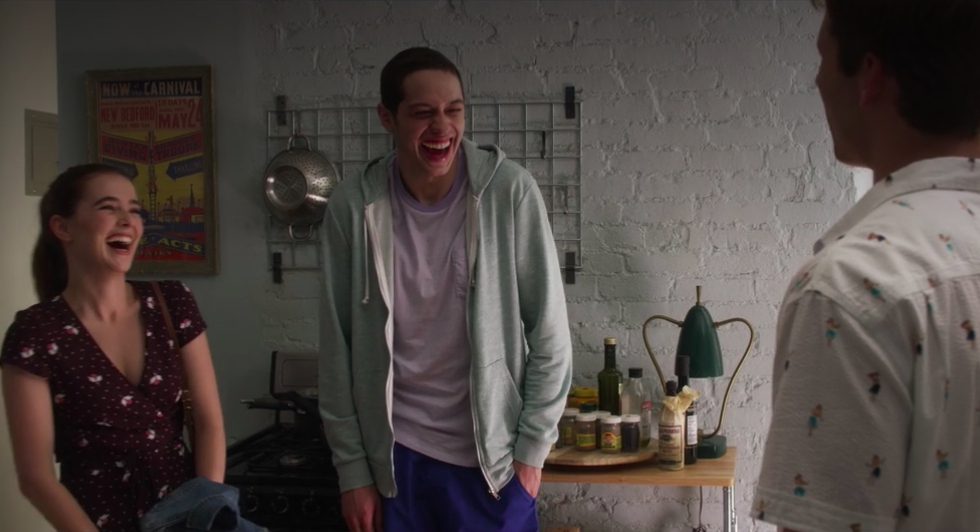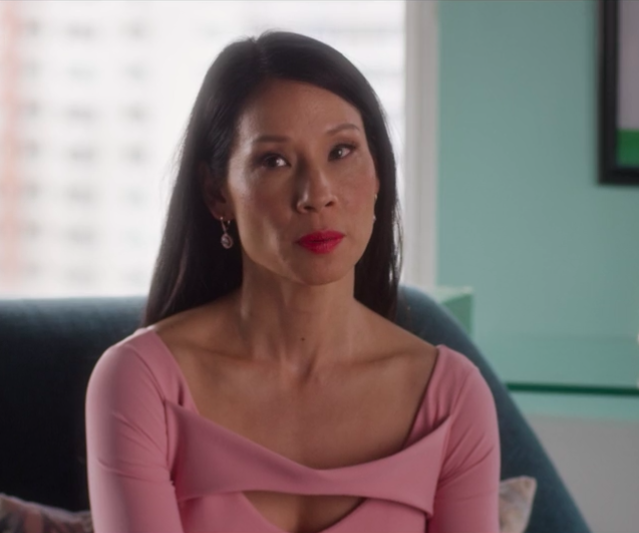
“Do I look like I can afford [to pay you] interest?” our protagonist Harper (Zoey Deutch) asks her budding love interest, Charlie (Glen Powell) nine and a half minutes into Netflix’s new romantic comedy, Set It Up. “I steal my toilet paper from the office bathroom!”
Hailed by Rolling Stone as the film that has “resurrected the modern rom-com,” Set It Up is a return to the cozy, comfort-food predictability of the classic romantic comedies of the ’90s and early 2000s. Harper is an aspiring sports journalist who works as an executive assistant to the formidable Kirsten (Lucy Liu). Charlie puts up with the tyrannical Rick (Taye Diggs) at his finance job in the hopes of finally being promoted. The two exhausted assistants fight each other over who’s going to snag a late-night dinner for their boss, and in the process, they hatch a plan: What better way to get their bosses off their backs than to use their encyclopedic knowledge of them to set their bosses up with each other?
With its zany hijinks carried out by loveable protagonists who come together, have a falling out, and finally reconcile, Set It Up certainly follows the classic rom-com formula. But the film also offers a surprisingly realistic depiction of life for a certain swath of twentysomething millennials.
“Millennial” has so many connotations that defining the term can be difficult. But while I am largely talking about the new workforce crowd (for whom “millennial” and “twentysomething” are synonymous), there is something about the millennial experience that goes beyond the stress and aimlessness of life in your twenties. Being a twentysomething in 2018 often means forgoing the traditional coming-of-age markers. Homeownership or marriage or a stable career might be things to try to work toward, but there’s no guarantee in them, no sense of a concrete ending place. You’re either getting help from your parents or sinking deeper into debt (or both).
In any case, it seems clear that writer Katie Silberman and producer Juliet Berman (who met when they were assistants in Hollywood) have crafted the film as a love story to this fluid, transitory time of life. “It's such a common sentiment to be at the bottom of the totem pole and have to do all of these jobs you don't want to do to get to what you want to do,” Silberman told the Hollywood Reporter earlier this month. “This movie is in some ways a love letter to my friends who are tortured assistants,” added Deutch.

The film is littered with recognizable hallmarks of the twentysomething millennial experience. Harper doesn’t have health insurance, and Charlie is still grinding as an assistant at age 28. They don’t have friends in high places, but they do have friends in weird places, from Yankee Stadium to the basement security center of their office building (where Tituss Burgess plays “Creepy Tim” with a fantastic and underutilized eccentricity). They joke around with each other as their friendship deepens; they steal the free chips from a Brazilian restaurant when they can’t afford the entrees and drunkenly eat slices of late-night pizza on the floor. Harper and Charlie adopt their friends’ friends as their own, joining forces in order to more effectively roast them. They use dating apps and make nonromantic declarations of love for everything from best friends to strangers to sports to pizza.
This version of New York isn’t quite as honest about the mixed-bag experience of living in NYC as Broad City, or even The Unbreakable Kimmy Schmidt (in which the city is, in intervals, disgusting, magical, exhausting, and uplifting). And Harper and Charlie are certainly still very privileged. But it feels truer to life than the New York City of the classic romantic comedy. Think of Meg Ryan in the late ’80s and early ’90s, in movies where NYC landmarks and casual dialogue are knit together like a comfortable sweater. And in the 2000s, films like How to Lose a Guy in 10 Days, 27 Dresses, Hitch, What Happens in Vegas, and 13 Going on 30 continued to glamorize the city with ever-increasing glitz.
In Set It Up, the true-to-life drawbacks of millennial living become the selling point of the film.
In 21st-century rom-com New York, teachers, assistants, and journalists can afford roomy apartments on the Upper West Side. No one has ever pooped on the subway; the streets are miraculously garbage-free; and there are no rats living in the walls of your apartments. Jobs may factor into the plot, but rarely is anyone actually seen working. In fact, most of these stories end with the protagonist getting the guy and losing or leaving her job, with no clear professional path forward after the movie ends. The job, like the setting, is decorative — an auxiliary to the romance.
And this kind of unattainability is actually the key to the New York rom-com. The settings are glamorous, the clothes flawless, the protagonists beautiful (and often older, closer to 35, with their professional lives firmly on track). It doesn’t matter if the life lived onscreen is one that doesn’t exist in the real world — that’s kind of the point. The audience of the New York rom-com doesn’t say I could have that person’s life; they wonder Why isn’t my life like that?
But in Set It Up, the true-to-life drawbacks of millennial living (at least within a certain milieu that’s still high above the poverty line nearly 20% of New Yorkers live under) aren’t excised or glossed over. They become the selling point of the film — the fount of its humor and charm. Everyone’s apartments are appropriately normal (if suspiciously well decorated) and shared with roommates. Charlie and Harper’s most pivotal scenes take place in their office building off Bryant Park — late at night as they scramble to find dinner for their bosses, or on lunch breaks or in elevators as they compare schedules to carry out the finer points of their not-so-dastardly plot. At 25 and 28 (and played by age-appropriate actors — Deutch is 23 and Powell 29), they have almost nothing figured out in their careers or in their personal lives.
Like a quintessential millennial (who tend to value authentic experiences over material goods), Charlie comes to the realization that money is not actually the key to happiness. He’s sitting in a too-fancy restaurant after his promotion with his girlfriend Suze (Joan Smalls), who calls the meal the best she’s ever eaten. “The best meal I ever had was a $5 pizza thrown up a fire escape,” says Charlie wistfully.
Real connection, not just the fateful romantic spark, is vital — “[Your girlfriend is] supposed to be your best friend,” says Charlie’s roommate, Duncan (Pete Davidson, who is very funny but utterly unbelievable as a gay man). But where older rom-coms finish the train of thought with “love is where true happiness lies,” Set It Up takes things one step further. Falling in love is important, but it’s not enough.

A network of close friendships matters; doing the right thing instead of the easy thing matters. And — at the core of this movie — finding a job that is both personally fulfilling and meaningful matters. At the end of Set It Up (in the true tradition of the rom-com), Harper doesn’t have a job, but neither does Charlie; she gives up hers to chase her true passion, and he gives his up to find out what his true passion actually is.
Set It Up is more fond of New York than the rom-coms of the 2000s are — it’s clearly (and affectionately) filmed in the city, placing our protagonists at the High Line, in Yankee Stadium, and outside Radio City (even if they are walking uptown instead of downtown in that last shot). Esperanto, the Brazilian Latin restaurant that Harper frequents (to the chagrin of the waiter, played by Jeff Hiller), is a real place on Avenue C in Alphabet City.
It’s also more thoughtful about its protagonists (but not, unfortunately, its supporting characters). It’s fun and accessible in a way that early career millennials who burn the candle at both ends understand. In a lot of ways, though, it still lives within the New York rom-com of the 2000s — just closer to street level.
Harper and Charlie are overworked, but they’re still privileged. They’re white, straight, cis, and abled, and while the supporting cast features several characters of color, these characters tend to be underdeveloped (like Suze) or edging perilously close to stereotype (like Charlie’s boss Rick, whose violence balloons into something cartoonish when added to his general sleazebag vibe). Lucy Liu is so fantastic that she manages to elevate Kirsten’s 2D role, but she’s the exception to the rule.

Our protagonists are broke but not poor: struggling enough to be relatable to most viewers, but not enough to bar them from buying Yankees tickets and throwing swanky rooftop parties. Even the millennial message that’s so obvious by the end — chase what you love, no matter what! — doesn’t account for the fact that sometimes, to stay afloat (and out of even more debt), you have to do the work you hate.
Set It Up hangs in this balance between the simple predictability of the rom-com and the millennial cardinal virtue of authenticity, like a string of Edison bulb lights at a rooftop bar — and for the most part, it actually pulls it off. It doesn’t dismantle the system that romantic comedy tropes have been built upon, or even do much to turn those tropes on their head. But here’s what it does do: Like Rick to Kirsten in the middle of the film, Set It Up looks twentysomething millennials square in the eyes and simply says I see you.
It’s not a complex declaration of love, and it rings a little hollow. It’s designed to validate a specific audience, but it’s validation nonetheless. It sees me eating popcorn for dinner at 8 p.m. in my office and telling another assistant that I’ve never actually been in a romantic relationship. It sees me writing this article at 2 a.m. on my couch in my tiny apartment, without a bra or a clear recollection of last time my living room was actually clean. And unlike the untouchable sheen of the New York rom-com, it tells you to keep eking out a living in pursuit of a dream — even if that dream is still a little bit impossible. ●
Kristen O'Neal is a writer, believer, crow lover, and cryptid hunter. She lives in NYC.
